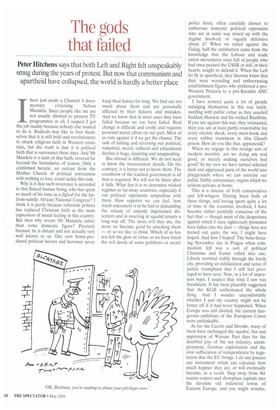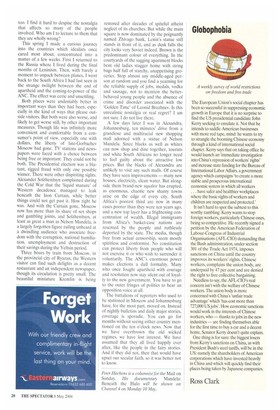The gods that failed
Peter Hitchens says that both Left and Right felt unspeakably smug during the years of protest. But now that communism and apartheid have collapsed, the world is hardly a better place
Ihave just made a Channel 4 docu
mentary criticising Nelson Mandela. Since people like me are not usually allowed to present TV programmes at all, I suspect I got the job mainly because nobody else wanted to do it. Radicals may like to fool themselves that it is still bold and revolutionary to attack religious faith in Western countries, but the truth is that it is political faith that is sacrosanct these days. And Mr Mandela is a saint of that faith, revered far beyond the boundaries of reason. Only a confirmed heretic, an outcast from the Mother Church of political correctness with nothing to lose, could tackle this task.
Why is it that such reverence is accorded to this flawed human being, who has spent so much of his time as a figleaf for the farfrom-saintly African National Congress? I think it is partly because reformist politics has replaced Christian faith as the main expression of moral feeling in this country. But then why revere Mr Mandela rather than some domestic figure? Precisely because he is distant and not actually very well known to us. Our own home-produced political heroes and heroines never keep their haloes for long. We find out too much about them and are personally affected by their failures and mistakes. And we know that in most cases they have failed because we too have failed. Real change is difficult and costly and requires personal moral effort on our part. Most of us vote against it if we get the chance. The task of halting and reversing our political, industrial, moral, cultural and educational decline is huge, daunting and unappealing.
But abroad is different. We do not need to know the inconvenient details. On the contrary, it is better not to know them. The overthrow of the loathed government is all that is required. We will not be there after it falls. What fun it is to denounce wicked regimes in far-away countries, especially if our political opponents sympathise with them. How superior we can feel, how much enjoyment is to be had in demanding the release of unjustly imprisoned dissenters and in sneering at squalid tyrants a long way off. The more evil they are, the more we become good by attacking them — or so we like to think. Which of us has not felt the glow of virtue as we have listed the evil deeds of some politburo or secret police force, often carefully chosen to embarrass domestic political opponents who are in some way mixed up with the regime involved, or vaguely defensive about it? When we railed against the Gulag, half the satisfaction came from the knowledge that the Labour and trade union movements were full of people who had once praised the USSR or still, in their hearts, sought to defend it. When the Left let fly at apartheid, they likewise knew that they were wounding and embarrassing establishment figures who preferred a proWestern Pretoria to a pro-Kremlin ANC government.
I have noticed quite a lot of people indulging themselves in this way lately, swelling with public virtue as they assailed Saddam Hussein and his wicked Baathists. If you are against this war, they insinuated, then you are at least partly responsible for every electric shock, every meat-hook and every rubber truncheon in Abu Ghraib prison. How do you like that, appeasenik?
When we engage in this strange sort of modem morality, are we doing any real good, or merely making ourselves feel good? In my view we have turned selected dark and oppressed parts of the world into playgrounds where we can exercise our pallid, flabby consciences, organs which we seldom activate at home.
This is a disease of both conservatives and left-wingers. Having been both of these things, and having spent quite a lot of time in the countries involved, I have become rather painfully conscious of the fact that — though most of the despotisms against which I once righteously protested have fallen into the dust — things have not turned out quite the way I might have hoped. And how I hoped! The bone-freezing November day in Prague when communism fell was a sort of political Christmas and Easter rolled into one. Liberty stormed visibly through the lovely city, providing an exhilaration and sense of justice triumphant that I still feel privileged to have seen. Now, in a lot of important ways, I suspect that what I saw was fraudulent. It has been plausibly suggested that the KGB orchestrated the whole thing. And I wonder uncomfortably whether I and my country might not be better off if it had never happened. When Europe was still divided, the current dangerous ambitions of the European Union were unthinkable.
As for the Czechs and Slovaks, many of them have exchanged the squalor, lies and oppression of Warsaw Pact days for the doubtful joys of the sex industry, unemployment, German exploitation and the slow suffocation of independence by regulation that the EU brings. I do not possess any instrument which can calculate how much happier they are, or will eventually become, as a result. Step away from the tourist centres and showplace capitals into the desolate old industrial towns of Eastern Europe, and you might wonder,
too. I find it hard to despise the nostalgia that affects so many of the people involved. Who am Ito lecture to them that they are wholly wrong?
This spring I made a curious journey into the countries which idealists once cared most about, concentrated into a matter of a few weeks. First I returned to the Russia where I lived during the final months of Leninism. Then, with barely a moment to unpack between planes. I went back to the South Africa I had last seen in the strange twilight between the end of apartheid and the coming-to-power of the ANC. The effect was eerie and unsettling.
Both places were undeniably better in important ways than they had been, especially in the kind of ways that please outside visitors. But both were also worse, and likely to get worse still, by other important measures. Though life was infinitely more convenient and comfortable from a consumer's point of view, especially one with dollars, the liberty of late-Gorbachev Moscow had gone. TV stations and newspapers were faced with a choice between being free or important. They could not be both. The Presidential election was a blatant, rigged fraud with only one possible winner. There were other dispiriting sights. Alexander Solzhenitsyn complained during the Cold War that the 'liquid manure' of Western decadence managed to leak beneath the Iron Curtain, while better things could not get past it. How right he was. And with the Curtain gone, Moscow now has more than its share of sex shops and gambling joints, and Solzhenitsyn, at least as great a man as Nelson Mandela, is a largely forgotten figure railing unheard at a dwindling audience who associate freedom with the corruption, national humiliation, unemployment and destruction of their savings during the Yeltsin period.
Three hours by train from Moscow, in the provincial city of Ryazan, the Western visitor can find such delights as a decent restaurant and an independent newspaper, though its circulation is pretty small. The beautiful miniature Kremlin is being restored after decades of spiteful atheist neglect of its churches. But while the main square is now dominated by the poignantly named Zhivago bank, Lenin's statue still stands in front of it, and as dusk falls the city looks very Soviet indeed. Brown is the predominant colour of everything. In the courtyards of the sagging apartment blocks bent old ladies stagger home with string bags half full of starchy, unappetising groceries. Stop almost any middle-aged person at random and you find a yearning for the reliable supply of jobs, medals, vodka and sausage, not to mention the betterbehaved young people and the absence of crime and disorder associated with the 'Golden Time' of Leonid Brezhnev. Is this unrealistic nostalgia or real regret? I am not sure. I do not live there.
A few days later I was in Alexandra, Johannesburg, ten minutes' drive from a grandiose and multiracial new shopping mall adorned with a statue of Nelson Mandela. Since blacks as well as whites can now shop and dine together, tourists and white South Africans no longer need to feel guilty about the attractive low prices. But the blacks of Alexandra are unlikely to visit any such malls. Of course they have seen improvements — many new houses, electricity, clean water. But alongside them brand-new squalor has erupted, as enormous, chaotic new shanty towns arise on the edge of every city. South Africa's poorest third are now in many cases poorer than they were ten years ago, and a new top layer has a frightening concentration of wealth. Illegal immigrants from Africa's basket-case nations are resented by the people and ruthlessly deported by the state. The media, though free from actual censorship, seem mostly spiritless and conformist. No constitution can protect liberty from people who will not exercise it or who wish to surrender it voluntarily. The ANC's enormous power makes elections a dull formality. Many who once fought apartheid with courage and resolution now stay silent out of loyalty to the new government. You have to go to the outer fringes of politics to hear an opposition voice at all.
The battalions of reporters who used to be stationed in Moscow and Johannesburg have, for the most part, moved on. Instead of nightly bulletins and daily major stories, coverage is sporadic. You can go for months without seeing either country mentioned on the ten o'clock news. Now that we have overthrown the old wicked regimes, we have lost interest. We have assumed that they all lived happily ever after, like the people in the fairy stories. And if they did not, then that would have upset our secular faith, so it was better not to know.
Peter Hitchens is a columnist for the Mail on Sunday. His documentary Mandela: Beneath the Halo will be shown on Channel 4 on Monday 10 May.













































































 Previous page
Previous page